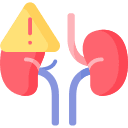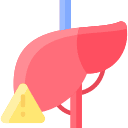(Bold for FDA approved)
 How ACAMPROSATE works
How ACAMPROSATE works• Theoretically reduces excitatory glutamate neurotransmission and increases inhibitory gamma-aminobutyric acid (GABA) neurotransmission
• Binds to and blocks certain glutamate receptors, including metabotropic glutamate receptors
• Because withdrawal of alcohol following chronic administration can lead to excessive glutamate activity and deficient GABA activity, acamprosate can act as “artificial alcohol” to mitigate these effects
• Has demonstrated efficacy in trials lasting between 13 and 52 weeks
 Notable Side Effects
Notable Side Effects• Diarrhea, nausea
• Anxiety, depression
 Life Threatening Side Effects
Life Threatening Side Effects• Suicidal ideation and behavior (suicidality)

unusual

unusual
• Wait
• Adjust dose
• If side effects persist, discontinue use
• 666 mg three times daily (>60 kg)
• 666 mg two times daily (<60 kg)
 Dosage Forms
Dosage Forms• Tablet 333 mg and 666mg
•Has been studied in trials up to 1 year
•No
 Renal Impairment
Renal Impairment• For moderate impairment, recommended dose is 333 mg three times daily
• Contraindicated in severe impairment
 Hepatic Impairment
Hepatic Impairment• Dose adjustment not generally necessary
 Cardiac Impairment
Cardiac Impairment• Limited data available
 Elderly
Elderly• Some patients may tolerate lower doses better
• Consider monitoring renal function
 Children and Adolescents
Children and Adolescents• Safety and efficacy have not been established
 Pregnancy
Pregnancy• Risk Category C [some animal studies show adverse effects; no controlled studies in humans]
• Pregnant women needing to stop drinking may consider behavioral therapy before pharmacotherapy
• Not generally recommended for use during pregnancy, especially during first trimester
 Breast Feeding
Breast Feeding• Unknown if acamprosate is secreted in human breast milk, but all psychotropics assumed to be secreted in breast milk
• Recommended either to discontinue drug or bottle feed
Based on data Published online by Cambridge University Press
Compiled by Dr. Jash Ajmera